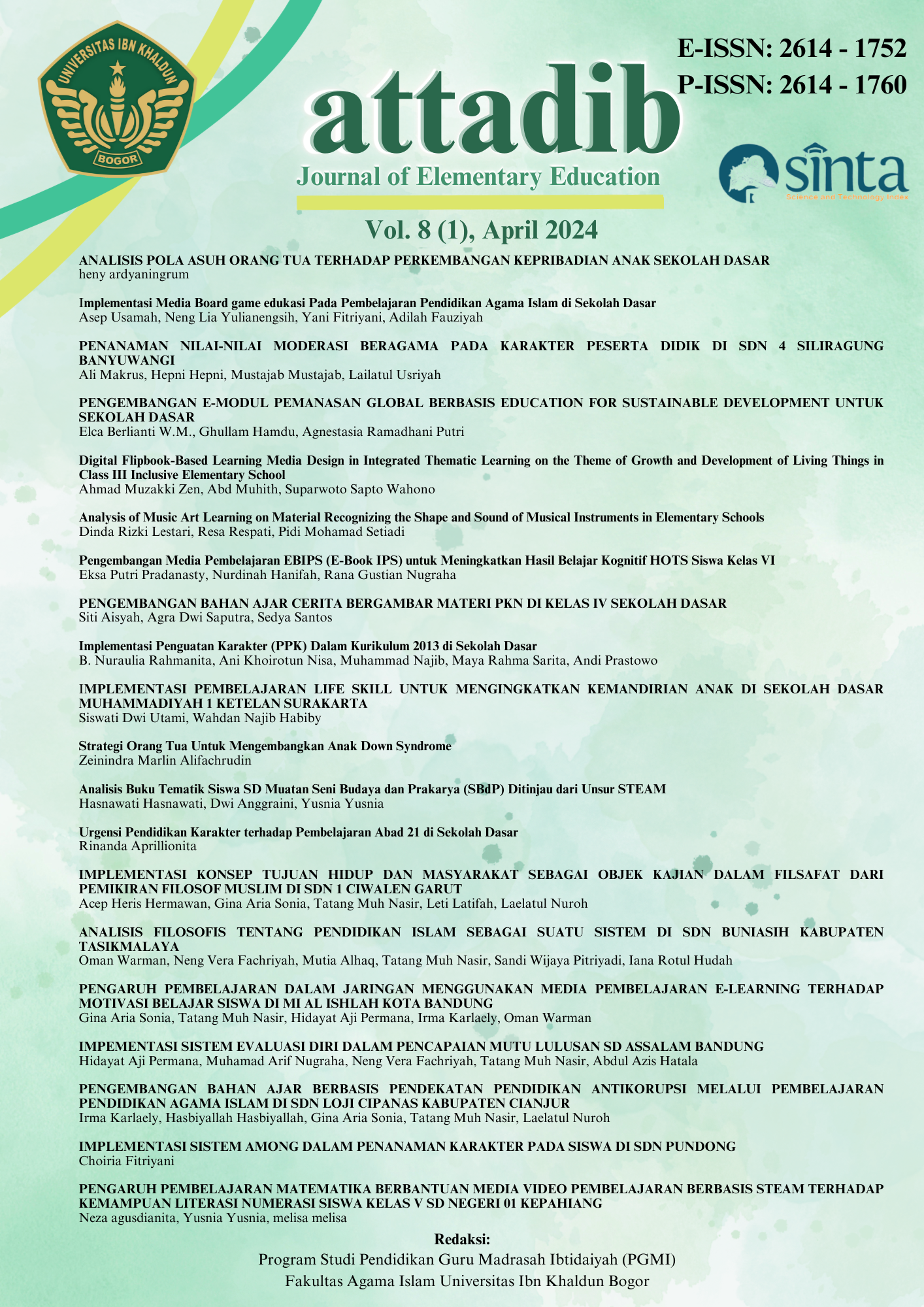MANAJEMEN KEBERSIHAN BERBASIS TANGGUNGJAWAB INDIVIDU DI SEKOLAH DASAR
DOI:
https://doi.org/10.32832/at-tadib.v2i2.19377Keywords:
Management, Hygiene, Elementary SchoolAbstract
School cleaning activities are generally something that no one wants. Most Indonesian people still assume that environmental hygiene is the work of janitors and helpers, not the collective responsibility of individuals. Not surprisingly, most schools in Indonesia have poor hygiene and health quality. This paper collects in- depth and comprehensive information from principals, teachers, and students at a private elementary school in the city of Purwakarta, West Java, regarding hygiene management in their schools. Unlike other schools, although it has two spacious and magnificent four-story buildings, this school does not have a single janitor. School cleanliness is truly a shared responsibility. In each day, dozens of teachers and hundreds of students clean up all parts of the school collectively in 15-20 minutes full of enthusiasm and awareness that cleanliness is a responsibility and part of their faith to Allah.
References
Anggraini, A. P., "Yang Terjadi Pada Tubuh Jika Berolahraga Secara Teratur", Kompas, 16 Maret 2018, diakses dari Https://Lifestyle.Kompas.Com/Read/2018/03/16/062000120/Yang- Terjadi-Pada-Tubuh-Jika-Berolahraga-Secara-Teratur.
Creswell, John. W. (2012). Educational research: Planning, conducting and evaluating quantitative and qualitative research. Boston: Pearson.
Departemen Agama RI. (2015). Al-Quran Terjemahan. Bandung: CV Darus Sunnah.
Hurlock, Elizabeth, B. (1978). Child development, sixth edition. New York: Mc.
Graw Hill, Inc.
Jambeck, J. R., Geyer, R., Wilcox, C., Siegler, T. R., Perryman, M., Andrady, A., ... & Law, K. L. (2015). Plastic waste inputs from land into the ocean. Science, 347(6223), 768-771.
Kerr, J. (1897). School hygiene, in its mental, moral, and physical aspects. Journal of the Royal Statistical Society, 60(3), 613-680.
Moleong, Lexy J. (2001). Metodologi penelitian kualitatif. Bandung: Remaja Rosdakarya.
Oebaidillah, S. (2016, 10 Maret). “Gerakan osoji sebagai bentuk diplomasi budaya baru”. Mediaindonesia. Diakses dari:
http://mediaindonesia.com/read/detail/36127-gerakan-osoji-sebagai-bentuk- diplomasi-budaya-baru.
Republik Indonesia, Undang-Undang Nomor 32 Tahun 2009 tentang Perlindungan dan Pengelolaan Lingkungan Hidup, Pasal 65.
Santrock, J.W. (2009). Child Development. 12th ed. New York: McGraw-Hil. Syantut, K. A. (2018). Mendidik anak laki-laki; bagaimana menyiapkan generasi
Islam yang unggul. Solo: Aqwam.
Syantut, K. A. (2018). Rumahku madrasah pertamaku; Panduan keluarga Muslim dalam mendidik anak. Jakarta: Maskana.
Tilaar, H. A. R. dan Nugroho, R. (2008). Kebijakan Pendidikan, Pengantar untuk memahami kebijakan pendidikan dan kebijakan pendidikan sebagai kebijakan publik. Yogyakarta: Pustaka Pelajar.
Unesco, U. (1977, October). The Tbilisi Declaration. In Intergovernmental Conference on Environmental Education (pp. 14-26).
























